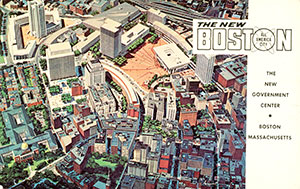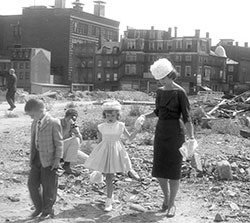
1965 rendition of a “New Boston,” depicting the new Government Center taking the place of Scollay Square.
By Sue Minichiello
Yesterday’s urban renewal is today’s gentrification. A bold statement? Perhaps, but there is no doubt that when neighborhoods are redeveloped in ways that exile their longtime residents and businesses, just as much — if not more — can be lost as gained.
That is the story of Boston’s West End, a vibrant, diverse, tight-knit community that vanished under the so-called “urban renewal” of the 1950s. Many of its 7,500 residents relocated to Somerville where their families remain today.
West End tenement houses with mom-and-pop storefronts fell to the wrecking ball, ultimately to be replaced by high-rises with professed suburban amenities, all in the name of progress. The destruction of the neighborhood came to be seen as a landmark case in urban planning circles. Its simplistic, top-down approach became a textbook example of how NOT to transform a city. As Winston Churchill said, “Those who fail to learn from history are condemned to repeat it.”
To preserve the history and honor the culture of the mourned neighborhood, and relate the vital lessons the story holds, The West End Museum is presenting the lecture series Reflections on Boston’s West End: The Origins & Lessons of Urban Renewal. The series aims to provide a comprehensive examination of the forces that led to the urban renewal programs in mid-20th century America. Structured as a series of seven lectures with discussion, each will have a distinct topic, but all use Boston’s West End urban renewal project as the primary example and connecting point.

Family in Sunday best walking over rubble of West End on way to St Joseph’s church.
“This tragic story of how 7,500 people were forcibly removed from their homes is still has much to teach us today. The clearance of the West End was a product of government overreach caused by a lack of true community input and a too-narrow idea of what progress meant,” said series presenter James Briand. “Today, we have vigorous online debate, but the control of information is getting more and more consolidated, and vocal but biased special interest groups are skewing the national conversation. This series helps us reflect on the importance of maintaining true civic discourse with room for multiple points of view.”
The story of Boston’s West End has implications far beyond the human suffering and loss to the City of Boston. The project prompted urban planning critics like Jane Jacobs to reconsider the prevailing expert opinion of the time that American cities needed to change to accommodate the automobile and suburban tastes. Jacobs suggested instead that each city compete on its own terms and celebrate neighborhood life and walkability.
“The aftermath of the West End urban renewal project signaled the reconsideration of the idea of progress in this nation,” said Briand. “Coming out of WWII, Americans had a high level of trust in government and experts. Beginning in the early 1960s, exposés like Silent Spring followed by events like the Vietnam War and Watergate taught us to question experts and consensus thinking. For cities, that began with the West End.”
Exploring the larger historical and social forces that led to the fall of the West End offers the chance to draw lessons relevant to what is happening in and around Boston — and countless urban areas across the US — today. Briand will lead attendees to look at the idea of the slum and how it developed in history, the impact of the automobile and suburbanization, the changing role of the federal government in US cities, and the way in which the whole idea of progress changed before and after the events of the West End.
“Whether people are looking for simply a powerful human story or a deeper understanding of Boston’s history and its bearing on modern cities, this series is for them,” said Briand.
Briand has worked with The West End Museum since 2009, developing classroom presentations and tours on various topics including urban renewal, the work of Jane Jacobs, the 1949 Housing Act, and Title One. Briand has authored numerous articles on local history and is a lifelong resident of the Boston area.
Reflections on Boston’s West End: The Origins & Lessons of Urban Renewal begins on February 19 with six subsequent sessions running through the fall. Attendees may opt to register for all seven lectures or cherry-pick the individual sessions in which they are most interested. Visit thewestendmuseum.org/events for more information, including lecture descriptions and dates. Pre-registration is required.















It’s really sad that in the next 100 years, all that will still exist in Somerville will likely be the Prospect Hill Tower and the Powderhouse. And maybe those will be gone, too.
I’m sick of people saying that gentrification is progress and that we should just get used to it and deal with it. Too many businesses that have served multiple generations in this city are gone, most because developers bought them out. Every Italian bakery we had is now gone, too, yet other cities like Medford still have them. All the cultural flavor this city had is slowly oozing away. Lindell’s won’t be far behind if the recent past is anything to go by.
All of our schools that served our city within the last 60 years are gone. Every Elementary and Junior High School I went to no longer exists here, including the High School building, which is being rebuilt. Those buildings are all likely apartments now.
Why does every new building have to be for living spaces? I have yet to see any major business (I’m not talking small niche businesses) take up shop in this city now, other than what’s already been here for the last 20 years. We’re just becoming a cookie-cutter city like Boston, who is also seeing long-time loved businesses going away little by little, in favor of apartments and condo development.
I have yet to hear of one businessman say they are taking over an existing business, such as a successful long-running bar or restaurant, to keep it going when the current owners decide to go. It’s always that developers are the highest bidders, and nobody wants to keep that business going for another 20 or 30 years, despite people loving it and wanting to continue being a patron of that business. Money shouldn’t win over loyalty.
There should be room for both the old and the new. Progress is fine, but it shouldn’t have to come at the expense of our history and tradition.
LindaS gets it. This is what happens when Our Revolution runs the show. These activists are clear that only nonprofits are worthwhile and existing business owners are opponents especially anyone in the Chamber of Commerce. It’s tough enough spending day and night trying to run a business no wonder many are deciding its time to retire.
Our Revolution councilors could care less about preserving anything their goal is to “increase supply” for their transient constituents for whom Somerville is nothing more than a cheap place to spend a few years.
If you think its bad now wait until you see what happens with the new zoning. Mayor Joe tried to strike a balance but Councilors rewrote it to be more developer friendly though probably don’t even understand what they passed.
If politicians don’t bother to learn the lessons of the West End history will repeat itself. This should be mandatory viewing for everyone at city hall.
Seriously Paula? Trying to get anyone on the political side of this to learn anything is a complete waste of time. There is no sympathy or caring there to be found. I have been trying for months to get those posts removed from the unused protected bike lane so the businesses can get back their customers and the less mobile people can have access. The city hall even got a letter form ada with many complaints about the disabled having a problem and nothing has changed. I have never seen such a non caring attitude toward people. Here is the letter.
This is a letter that was sent to the Somerville Traffic & Parking Department from the Americans With Disabilities Act (ADA) regarding Broadway Bus and Bicycle Lane Impact on Residents with Disabilities:
I am submitting this brief memorandum in my capacity as the Americans with Disabilities (ADA) Coordinator for the City of Somerville.
Since the implementation of the bus and bicycle lanes on Broadway, my office has received resident concerns regarding accessibility impacts for people with disabilities. Presently, the bicycle lane flex posts block vehicle access for curbside pickup and drop-off of residents. Additionally, vehicles are prohibited from entering the bus lanes in order to pick up residents. This has been particularly burdensome for residents with physical disabilities who rely on door to door transportation in order to safely attend medical appointments or to conduct their daily activities. This change has been distressing for residents as they are being forced to either stay home or navigate a difficult distance on sloped sidewalks in order to reach their driver. I anticipate that we will continue to receive such concerns from residents.
I am happy to elaborate further or answer questions that you may have. I can be reached at 617- 625-6600 x2323 or at nsalamoun@somervillema.gov
Sincerely,
Nency Salamoun
Manager of Diversity, Equity and Inclusion
The problems are the costs of living/doing business in the city. The average person simply can no longer absorb the rising taxes and fees. This in addition to dealing with the unnecessary traffic and lack of parking caused by the policies of the city.
The West End ripped down housing and replaced it with almost no housing. That should not be confused with replacing post-industrial blight with housing, which is almost the opposite. I’d like to see a broader mix of housing types in those areas, something that would house people with a broader range of incomes, but if a city didn’t change from when you were a kid and now you’re old, then you’re living in a dying city.
My kids have gone to one of those new schools. Glad they’re here. Excited to see the new high school.
That’s incorrect Villenous. The West End was a dense neighborhood of shops businesses and homes that was ripped down and replaced with housing towers creating more housing but displacing an entire neighborhood. This happened because politicians and planners wanted to do something radical to solve a “housing crisis”. Sound familiar?
Our Revolution darling Councilor Ben Ewen-Campen now says he wants our dense neighborhoods torn down and replaced with affordable housing towers to solve the “housing crisis”. And now he is chair of the City Land Use Committee. He needs a history lesson.
@ Paula – “O.R. darling Councilor Ben Ewen-Campen…,” eh?
Gawd, your ill-informed right-wing venom is tiresome.
The population in the West End was around 60,000 in the early 1900s. Today it’s 6,000.They built minimal housing, which is painfully obvious. The street over there are mostly deserted once the workday ends. 1950s “urban renewal” was about getting rid of housing and building office towers.